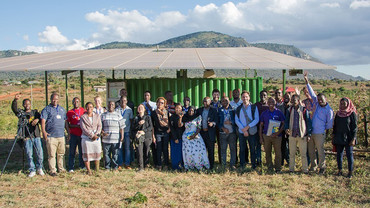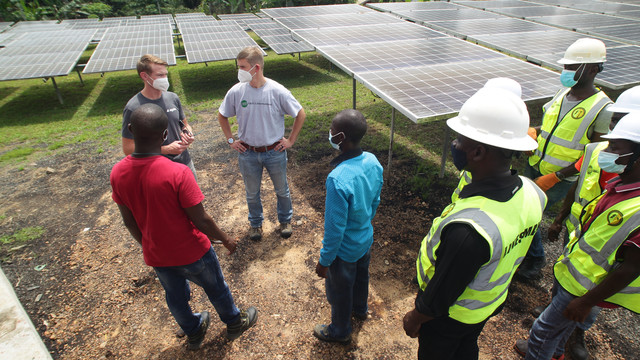How energy can generate growth in Tanzania's rural economy
A workshop in Tanzania explored how off-grid energy can power opportunities for economic growth in rural communities. Guest blogger Basil Malaki reports back


Esilalei, Tanzania: Teresia Olotai uses a refrigerator plugged into a solar powered micro-grid. Delivering energy access could help to transform Tanzania's rural economy (Photo: Morgana Wingard, USAID, Creative Commons via Flickr)
Tanzania is undergoing a remarkable economic transformation. But this rapid growth is concentrated in towns and cities and not matched in remote areas; poorer, rural communities are being left behind.
A major factor underpinning this disparity is Tanzania's huge rural-urban energy divide. According to the Tanzanian government's Energy Access Situation Report (PDF) almost two in three urban households in mainland Tanzania have access to electricity compared with less than one in five in rural areas. Of households with connectivity, almost all urban households are grid-connected compared with just over a third of rural households.
Rural communities cannot lift themselves out of poverty without safe, reliable and affordable energy. Indeed, the Sustainable Development Goals recognise that energy access is crucial for giving everyone a fair chance at living a healthy, decent and dignified life.
And electricity supply needs to go beyond household use for lighting homes, charging phones or powering household appliances such as radios and TVs. To grow Tanzania's rural economy requires 'productive use' of energy (PUE) – to power local businesses, provide better health and education services, and drive agriculture production.
A workshop in Dar es Salaam in July organised by the Hivos/IIED Energy Change Lab brought together government agencies, energy providers, policy influencers, donors, micro financiers, researchers and other sector experts to explore how increasing energy for productive use could transform Tanzania's rural economy.
During the two-day workshop, brainstorming and lively debate helped identify some key opportunities for driving economic growth in rural communities. These opportunities can be approached on a sector-by-sector basis:
Agriculture: Tanzania's economy is heavily dependent on agriculture but the sector is still facing challenges, including prolonged drought and unpredictable weather. Energy providers have come up with affordable technologies that could boost incomes of smallholder farmers.
Farmers can use solar powered water pumps for irrigation to increase their yield and improve crop quality. Horticultural and fish farmers can use electricity to refrigerate their produce while searching for markets. This reduces waste caused by poor storage and can significantly increase profit margins.
Health: With a more reliable energy supply, hospitals and clinics in rural communities can provide safer health services. Here, electricity has been used to power appliances such as microscopes, defibrillators and operation room equipment.
Small and medium-sized enterprises (SME): "To make businesses sustainable, [the] quality of products needs to be continually improved. If we are really looking to support and sustain local producers, community products should be promoted and consumed in the local market," said a workshop attendee.
During the workshop, adding value to SME products was identified as key to generate income for rural communities. Examples given were using solar power to dry food to reduce post-harvest losses, and small-scale food processing such as oil pressing, juice blending and milling. Therefore, the Energy Change Lab's call is to empower more communities to consider engaging in small-scale productive businesses.
How will we get there?
Electricity products and services are an integral part of driving growth in rural economies. But achieving real impact requires more than simply having access to electricity.
More cross-cutting thinking is needed to explore electricity products and services to deliver results in the sectors mentioned above: exploring the finance and business models that can bring electricity service businesses into remote areas, linking in access to consumer finance to buy equipment and provide start-up capital for SME businesses, and sharing knowledge and building skill sets on what works in different contexts across Tanzania.
During the two days, participants were facilitated through a process that eventually arrived at identifying possible solutions. Groups self-organised around ideas for prototypes – small-scale interventions that have the potential to scale up and can generate learning around what works in a system. Among them were the following prototypes:
- PUE access to finance initiative: one group believed that asset financiers need to be incentivised to provide loans and equipment to local entrepreneurs who will connect to the mini-grid and use electricity for productive activities. The group recommended that energy suppliers act as facilitators of the process; providing pipelines of entrepreneurs and the viable productive use activities in their project sites
- Creating a platform for information on PUE in Tanzania: centralising PUE activities and information was identified as a means to increasing investment in PUE; increasing and accelerating PUE investments as well as creating more social and economic benefits in rural communities requires stakeholder interventions and partnerships.
This group suggested bringing together all stakeholders through a platform for learning and sharing experiences to fast track development of PUE projects and investments in Tanzania. The group recommended existing energy institutions such as TAREA should take charge of creating this platform and invite all stakeholders, and
- Efficient use of excess heat from solar driers: in this case, communities would use existing solar driers to increase productivity and improve their livelihoods by harvesting the electrical power of excess heat. With their experience in solar drying, this group suggested the use of existing food driers to dehydrate food while tapping the excess heat generated for other purposes such as heating houses, egg incubation and powering electrical appliances.
The Energy Change Lab will continue to explore how energy providers, policymakers, financiers and funders can work together to reform Tanzania's energy sector – to develop innovative, sustainable opportunities where people from Tanzania's most remote communities are at the centre. Watch this space for further updates.
Basil Malaki (bmalaki@hivos.org) is the communication and logistics lead at the Energy Change Lab. This blog was originally posted on the Energy Change Lab.




